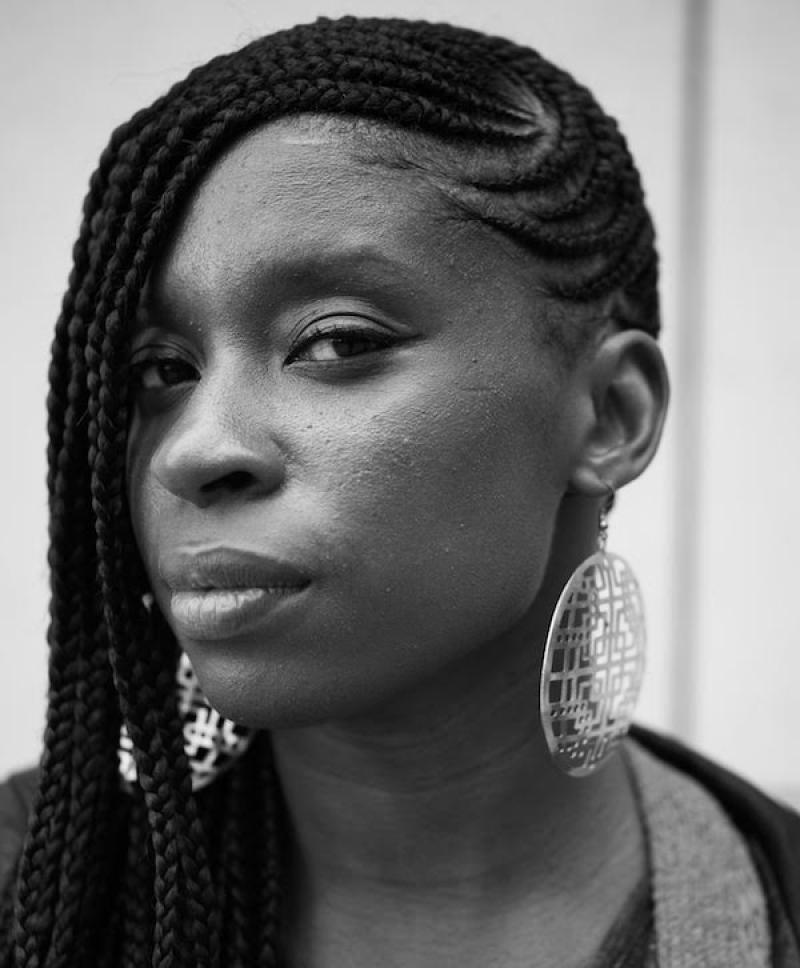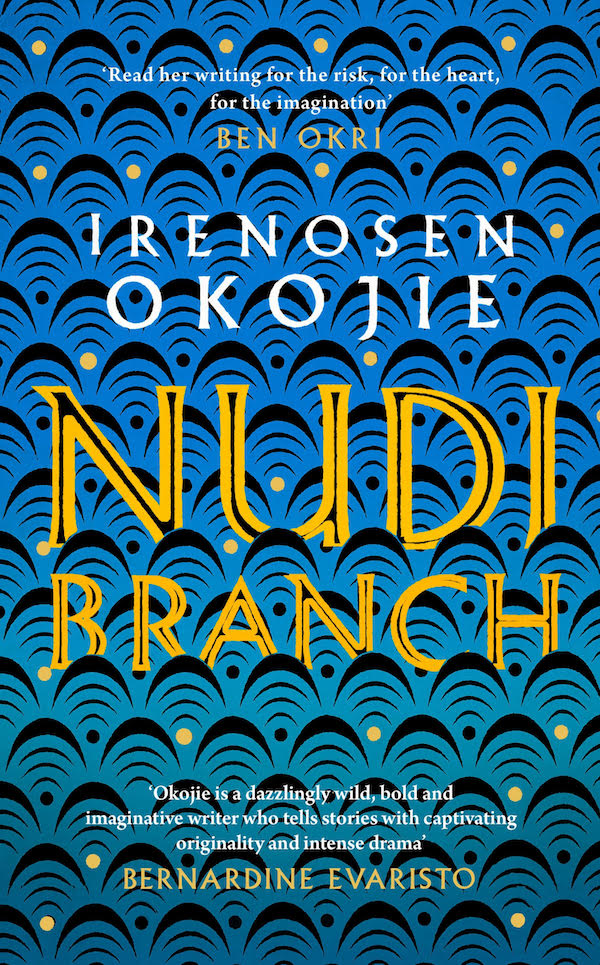Irenosen Okojie: Nudibranch review - daring and surreal | reviews, news & interviews
Irenosen Okojie: Nudibranch review - daring and surreal
Irenosen Okojie: Nudibranch review - daring and surreal
A bold and inventive collection of short stories nourished on the darkest of thoughts

Visceral, gaudy, alien, otherworldly to the point of being almost improbably imaginative, the nudibranch serves as an appropriate figure for Nigerian-British writer Irenosen Okojie’s muscularly surrealist prose. Look up a picture of one if you haven’t before: the nudibranch is an exuberant, kaleidoscopic variety of sea slug.
The goddess Kiru arrives at an island populated by eunuchs who have gathered for the ceremony of Haribas: a carnival of lovemaking. Morphing into the shapes of different women, she seduces these men, and eats their hearts:
Catching him unaware, she sticks her fingers into his chest, melting flesh. The charred scent rising up to their nostrils as a pattern of smoke unwinds from his chest shaped like small nudibranch. She reaches through bone, a blueprint at birth washed away by the pumping of blood. … She runs a finger over [his heart], over the pumping rhythm she has already caught with the damp folds of her vagina.
Much as the nudibranch disturbs our sense of form and propriety, Okojie’s imagery flexes between oneiric referent and corporeal junk. The body is a site of grotesquery and fascination, and tongues and lungs are strewn about the stories, along with other entrails. In this story, the carrier pigeons overhead “mimic the sound of a lung sinking, chasing an echo thinking they can catch it.” In ‘Grace Jones’, which follows the troubled history of a Grace-Jones impersonator from Martinique haunted by dreams of gutted houses, cake ingredients and cardboard boxes, Okojie’s protagonist notices “tongues in the wine flutes, floating then curling mid scream, sinking to the bottom” as the draughtsman of her nightmares stalks waking events. ‘Filamo’ is propelled by the seditious intent of a severed tongue, which drives a community of time-mangling monks to maddening silence and bloody destruction:
Inside the Abbey, a tongue sat in the golden snuff box on an empty long dining table; pink, scarred and curled into a ruffled, silken square of night. The previous week, the tongue had been used as a bookmark in a marked, leather bound King James bible.
 As this makes clear, Okojie’s imagination is frequently funny, and defiantly weird. Her slippery stories are not bound by logic, time or place; both within and between tales she dives between the genres of fable, dystopia, allegory, lyrically conceived realism, and horror. “Magical realism” is a label that has been applied loosely to her previous work – including the award-winning novel Butterfly Fish (2015) and her first collection of short stories, Speak Gigantular (2016), whose success led the Guardian to name this book as one of its most anticipated reads of 2019. Yet her energetically fantastical portraits – often of women negotiating dramas of struggle, vulnerability and dominance – also bear a resemblance to Mark Fisher’s understanding of the “weird” in The Weird and the Eerie, which signals “a particular kind of perturbation”, both compelling and repelling our attention, allowing us “to see the inside from the perspective of the outside.” Dream logic: a travelling chef who discovers a fossil that becomes a woman; a traveller recently returned from a trip to Sydney who disintegrates into liquorice, “black, gleaming, edible, sweet.” Or stillborn babies “brought to life with technology”, tethered to artificial umbilical cords, who have to be recharged every two weeks. “It is the irruption into this world of something from the outside which is the marker of the weird.”
As this makes clear, Okojie’s imagination is frequently funny, and defiantly weird. Her slippery stories are not bound by logic, time or place; both within and between tales she dives between the genres of fable, dystopia, allegory, lyrically conceived realism, and horror. “Magical realism” is a label that has been applied loosely to her previous work – including the award-winning novel Butterfly Fish (2015) and her first collection of short stories, Speak Gigantular (2016), whose success led the Guardian to name this book as one of its most anticipated reads of 2019. Yet her energetically fantastical portraits – often of women negotiating dramas of struggle, vulnerability and dominance – also bear a resemblance to Mark Fisher’s understanding of the “weird” in The Weird and the Eerie, which signals “a particular kind of perturbation”, both compelling and repelling our attention, allowing us “to see the inside from the perspective of the outside.” Dream logic: a travelling chef who discovers a fossil that becomes a woman; a traveller recently returned from a trip to Sydney who disintegrates into liquorice, “black, gleaming, edible, sweet.” Or stillborn babies “brought to life with technology”, tethered to artificial umbilical cords, who have to be recharged every two weeks. “It is the irruption into this world of something from the outside which is the marker of the weird.”
But it is also true that, in the wrong context, the nudibranch is at risk of appearing ridiculous – guilty of a certain showy ostentation. Sometimes Okojie’s stylistic vaults stretch too far in their quest for originality: “Edwin’s low timbered voice had been like a liquid concoction my limbs were drawn to, our shadows rustling in tepee tends for seeds suffering for heat stroke while we wandered.” Or in ‘Point and Trill’, perhaps the weakest of the collection: “He turned to Bronwyn who was staring out the window at cloaks of darkness shifting off undulating green mounds into restless costumes”.
Nudibranch is nevertheless a bold and inventive collection which follows the dark places of our thoughts, as the same time that it is witty, wondering and mischievous. Certainly, it adds depth to Okojie’s comment that she “tend[s] to operate from a place of curiosity as a writer rather than authority” – daring us to see the nudibranch in the shapes of the everyday.
- Nudibranch by Irenosen Okojie is published by Dialogue Books, hardback £14.99
- Read more book reviews on theartsdesk
rating
Explore topics
Share this article
The future of Arts Journalism
You can stop theartsdesk.com closing!
We urgently need financing to survive. Our fundraising drive has thus far raised £49,000 but we need to reach £100,000 or we will be forced to close. Please contribute here: https://gofund.me/c3f6033d
And if you can forward this information to anyone who might assist, we’d be grateful.

Subscribe to theartsdesk.com
Thank you for continuing to read our work on theartsdesk.com. For unlimited access to every article in its entirety, including our archive of more than 15,000 pieces, we're asking for £5 per month or £40 per year. We feel it's a very good deal, and hope you do too.
To take a subscription now simply click here.
And if you're looking for that extra gift for a friend or family member, why not treat them to a theartsdesk.com gift subscription?
more Books
 'We are bowled over!' Thank you for your messages of love and support
Much-appreciated words of commendation from readers and the cultural community
'We are bowled over!' Thank you for your messages of love and support
Much-appreciated words of commendation from readers and the cultural community
 Justin Lewis: Into the Groove review - fun and fact-filled trip through Eighties pop
Month by month journey through a decade gives insights into ordinary people’s lives
Justin Lewis: Into the Groove review - fun and fact-filled trip through Eighties pop
Month by month journey through a decade gives insights into ordinary people’s lives
 Joanna Pocock: Greyhound review - on the road again
A writer retraces her steps to furrow a deeper path through modern America
Joanna Pocock: Greyhound review - on the road again
A writer retraces her steps to furrow a deeper path through modern America
 Mark Hussey: Mrs Dalloway - Biography of a Novel review - echoes across crises
On the centenary of the work's publication an insightful book shows its prescience
Mark Hussey: Mrs Dalloway - Biography of a Novel review - echoes across crises
On the centenary of the work's publication an insightful book shows its prescience
 Frances Wilson: Electric Spark - The Enigma of Muriel Spark review - the matter of fact
Frances Wilson employs her full artistic power to keep pace with Spark’s fantastic and fugitive life
Frances Wilson: Electric Spark - The Enigma of Muriel Spark review - the matter of fact
Frances Wilson employs her full artistic power to keep pace with Spark’s fantastic and fugitive life
 Elizabeth Alker: Everything We Do is Music review - Prokofiev goes pop
A compelling journey into a surprising musical kinship
Elizabeth Alker: Everything We Do is Music review - Prokofiev goes pop
A compelling journey into a surprising musical kinship
 Natalia Ginzburg: The City and the House review - a dying art
Dick Davis renders this analogue love-letter in polyphonic English
Natalia Ginzburg: The City and the House review - a dying art
Dick Davis renders this analogue love-letter in polyphonic English
 Tom Raworth: Cancer review - truthfulness
A 'lost' book reconfirms Raworth’s legacy as one of the great lyric poets
Tom Raworth: Cancer review - truthfulness
A 'lost' book reconfirms Raworth’s legacy as one of the great lyric poets
 Ian Leslie: John and Paul - A Love Story in Songs review - help!
Ian Leslie loses himself in amateur psychology, and fatally misreads The Beatles
Ian Leslie: John and Paul - A Love Story in Songs review - help!
Ian Leslie loses himself in amateur psychology, and fatally misreads The Beatles
 Samuel Arbesman: The Magic of Code review - the spark ages
A wide-eyed take on our digital world can’t quite dispel the dangers
Samuel Arbesman: The Magic of Code review - the spark ages
A wide-eyed take on our digital world can’t quite dispel the dangers
 Zsuzsanna Gahse: Mountainish review - seeking refuge
Notes on danger and dialogue in the shadow of the Swiss Alps
Zsuzsanna Gahse: Mountainish review - seeking refuge
Notes on danger and dialogue in the shadow of the Swiss Alps
 Patrick McGilligan: Woody Allen - A Travesty of a Mockery of a Sham review - New York stories
Fair-minded Woody Allen biography covers all bases
Patrick McGilligan: Woody Allen - A Travesty of a Mockery of a Sham review - New York stories
Fair-minded Woody Allen biography covers all bases

Add comment